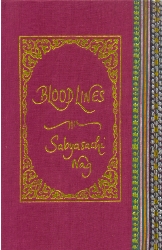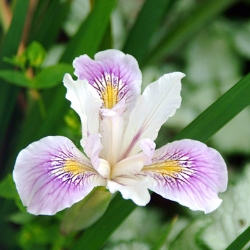|
Christopher T. George
Sabyasachi Nag,
Bloodlines, A Writer’s Workshop Redbird Book, ISBN 81-8157-571-7
hardback (100 Rupees), 50 pages, 2006, Available from Lake Gardens Press, 162/92 Lake Gardens, Kolkata 700 045, India.

Calcutta, India-born Sabyasachi Nag, now a resident of Mississauga, Ontario, Canada, represents one of the new, refreshing voices writing poetry today. A poet sensitive to what is happening in the world around him, Sachi Nag writes vividly and strongly on themes that draw from his Indian background, on nature topics, and on current events. His writing is never dull but is full of fresh surprises that reward the reader.
The poet is unflinching in tackling difficult and brutal topics. A dedication at the front of the book explains that the poem “On the Very Rational Death of Bijal Joshi” is dedicated to a woman who was raped by her lover and five men on New Year’s Eve, 2004, in Gujarat, India. Subsequently, she hanged herself after police investigating the case “pigeonholed her as a prostitute who didn’t get paid for sex.” Thus, the poem opens strongly and memorably:
No. You had no choice, but to die prostituted.
Intransitive, absent, multi-breasted, fire-womb
we know love can take no forced objects.
Prostitutes can. . . .
Sachi Nag’s style is to mix some surreal imagery and ideas with matter-of-fact statements, employing daring language that challenges the senses, and to drag the reader’s mind into areas where normally we might be unwilling to venture. Look at the kaleidoscoped, layered effect the poet achieves in the following poem about a sick child:
Fever
Out there it’s starless. Moon’s drowned too.
Son’s running flu. I wring
a soaked kitchen towel over his head.
That’s what I do with the full flu.
(How about some air?)
I grab a travel brochure and fan.
Relentless, till the blue
pages with pretty lakes and red cabins
get beat’n into a dream, deferred.
(But they hate me for that, mom ‘n’ son.)
Night long that’s all we do;
the three of us with a worn towel, warm
water and silent, seething hatred. Mom
checks every hour if the efforts paid.
(Whatever pays without faith?)
Dogs smell it. They lean out.
Tiny grains of yellow light bursting
down his neck, armpits, spine;
sweat everywhere. They stop barking.
(“Fire the confetti - the rock star’s home!” They laugh at that.)
‘last we are happy. Things are settling.
We forget every darned thing:
I have a bun ‘n’ bite the bed.
Sun bullets through the shutters.
From the balcony it’s a white day with some chin
but the grocer quarrels with a pal
stoned outside his store, someone rams
a milk-van and we are back into fairy-tale land.
Missus Grocer cranes ‘n’ crashes
into a pile of burning maple leaves.
Wife’s legs sleep. Fever snakes back in, cozy.
A half moon and a fallen tree:
hangs from a dumb nail.
Paint’s peeling off the wall.
I should have fixed it long.
Not now. Not anymore.
Whatever topic Sachi Nag chooses to tackle is seen using a clear-eyed, no-nonsense approach. Although the next selection is on the surface less adventurous than “Fever”, it nonetheless also presents the reader with challenges:
Dogs Know
After the umbilical chord
cut the larynx,
for language is yet another God.
Milk-y-way eyes, labium
for the seasons, my skin.
Riverine, my triangular mind.
Blue soul on my tongue, burning.
Who needs style?
To sit on a tombstone as the tulip,
open and shut to the sun, kisses
let settle on ear lobes like dew -
sound towers, metaphors?
What have I to hide?
Your praise is all I seek.
Praise for the nouned moves:
gnaw, froth, bite, yawn. To seethe
to stretch, to womb, to swirl
into memory, I have no need to speak.
The poem ends with clever use of assonance and some delicious word choices.
One of the poems included in this book, “Sweat,” was a poetry workshop pick by poet Pascal Petit for the
British Guardian newspaper last summer. Ms. Petit praised the poem: “I admire how loss is conveyed through the image of sweat in this poem. It’s a superb example of how smell is a powerful evoker of childhood memories and emotions, and of how it can contain them and transmit them to the reader's senses without one overt reference to feelings. . . . I’m very impressed by the power and economy of this poem.”
For myself, I admire how the poet makes himself seem to be a small child, so that we believe it really is the boy speaking:
Sweat
You are in the shower, washing
off our soccer game.
Tomorrow I'll practice with the wall.
I follow you through rooms
as you slip into a guard's uniform
checked tie, blue coat.
You let me nibble off your plate
pack your duffle bag, count your change,
wind your watch, tighten your belt
shine your shoes. Like clock hands
I hang from your neck. It’s time
for the final peck.
Chewed betel from your breath,
contours of your cologne
brush my seven-year-old cheek.
The air will be naked soon.
For one more day your sweat will linger
in the wardrobe
and the laundry room.
The hardback limited edition of Sachi Nag’s book is beautifully presented, gold-embossed, hand-stitched, hand-pasted and hand-bound by Tuliamiah Mohiuddin with handloom sari cloth woven and designed in India. A recommended collection to savor and enjoy time and again. By the way, you will note that the prices for the book are expressed in rupees. Do the conversion. The price of 100 rupees is, at the moment that I write, only $2.22! Send additional cash to the address in India and you will cover air mail postage as well. Or else you can get it directly from the author by contacting him at
[email protected].
© Christopher T. George
|

